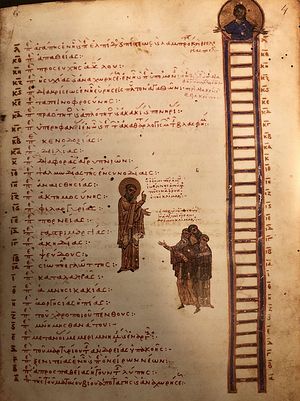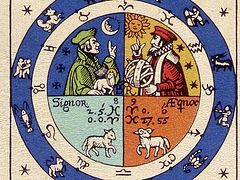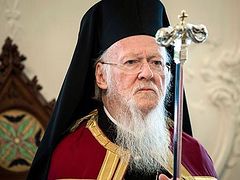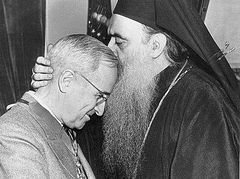Princeton, New Jersey, March 1, 2019
 One of the manuscripts in question, depicting St. John Climacus’ Ladder of Divine Ascent. Photo: nyt.com Princeton University has denied all allegations that it is unlawfully holding ancient Orthodox manuscripts, as a lawsuit filed by Patriarch Bartholomew charges. The school is also seeking compensation for legal costs, reports the Daily Princetonian.
One of the manuscripts in question, depicting St. John Climacus’ Ladder of Divine Ascent. Photo: nyt.com Princeton University has denied all allegations that it is unlawfully holding ancient Orthodox manuscripts, as a lawsuit filed by Patriarch Bartholomew charges. The school is also seeking compensation for legal costs, reports the Daily Princetonian.
The claim involves three illuminated Byzantine manuscripts more than 1,000 years old that have been valued treasures in Princeton’s collection for decades, reports the New York Times.
The manuscripts are St. John Chrysostom’s Commentary on the Gospel of Matthew, written by Nikephoros the Notary in 955, St. John Climacus’ Ladder of Divine Ascent, written by the scribe Joseph in Constantinople in 1081, and pages from the 9th-century that were probably part of St. John’s Commentary that may have been rebound at some point to the Ladder. The plaintiffs are also seeking the return of a 16th-century version of the Commentary.
The university received them as a gift in 1942 from a trustee and alumnus who had bought them at a German auction house in the 1920s. However, the lawsuit, filed in December 2018, claims that Bulgarian guerillas stole the manuscripts when they stormed the Theotokos Eikosiphoinissa Monastery in 1917 and assaulted the monks living there. The plaintiffs, including Pat. Bartholomew, the Metropolis of Drama, and the monastery, therefore believe the university’s possesses the manuscripts unlawfully and have demanded their return.
The university has countered that not only does it possess the manuscripts legally, but that it does not even have relevant or sufficient information to determine whether the plaintiffs were ever the legitimate owners in the first place.
Moreover, the school claims that there is evidence to suggest that two of the manuscripts “were,” in fact, “gifted to St. Andrew of the Russians in 1877 – long before 1917.”
However, the lawsuit cites the book Greek Manuscripts at Princeton, Sixth to Nineteenth Century: A Descriptive Catalogue, published in 2010, which identifies some manuscripts in the university’s collection as having been removed from the monastery by Bulgarian authorities in 1917.
“This is Princeton’s book, issued by the Princeton press, about Princeton’s collection, written by Princeton employees,” said George A. Tsougarakis, a lawyer representing the Patriarch, the monastery, and regional Church officials in the case. “In our view that’s about as concrete an admission as you could get.”
The university has countered that it has full confidence that the provenance research it has done establishes that the manuscripts were not looted, and that there is insufficient evidence to show that the monastery was assaulted by Bulgarian troops or that the stolen material includes the manuscripts in question.
According to Classics professor Emmanuel Bourbouhakis, specializing in the study of medieval Greek and Byzantine manuscripts, notes that the manuscripts in question were not included in an inventory of the looted manuscripts written soon after the raid.
Moreover, “There is at least as much evidence that this and other monasteries under Patriarchal jurisdiction, which had fallen on hard times, had sold off valuable manuscripts before the Balkan Wars in order to [financially] sustain themselves,” Bourbouhakis said.
Princeton has requested that the case be dismissed without prejudice and that it be awarded the costs “expended in defending this litigation.”
Follow us on Facebook!



